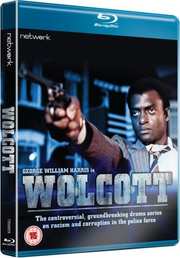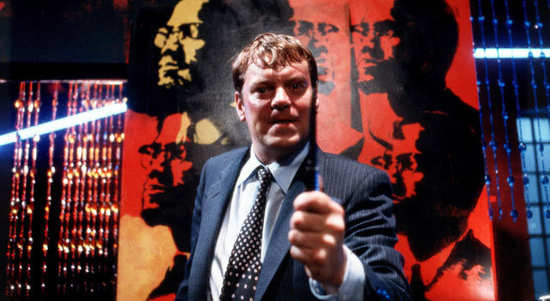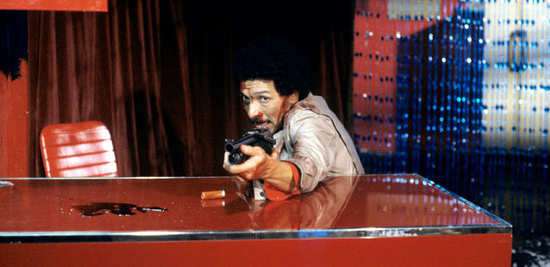Review for Wolcott - The Complete Series
Wow, ‘Wolcott’ is a weird beast. It could really only have come from the small historic time window in which it was made and as a result is absolutely fascinating. Which doesn’t necessarily mean it’s great television.
Apparently, the four one hour mini-series format (shown on four consecutive nights in 1981) was the UK’s first attempt at the format, possibly inspired by the huge impact of ‘Roots’ (1977). Maybe that also accounts for having a black actor in the lead role which was unusual for the time.
TV Times said of its star George William Harris, "He's Big. He's Black... our answer to Sydney Poitier's Mr Tibbs in In the Heat of the Night." The Blaxploitation vibe of the series, albeit with a South-East London bent, is unarguably present, not least because of the ever present black music soundtrack, a combination of street-sassy funk and disco with liberal helpings of reggae too. Which is no bad thing.
However, the plain truth of the matter is that it probably has more in common with Euston Films fare, like ‘The Sweeney’ with its gritty portrayal of police corruption, racism and frequent violence.
What’s perhaps most remarkable about the series is that it’s actually the product of ITC, better known for its glossy 35mm programmes like ‘The Prisoner’ and ‘The Persuaders’ than this almost documentary-like grittiness. ‘Jason King’ had been shot on 16mm, the first ITC series to have done so, and it looks very much like ‘Walcott’ was too.
Also, as was the ITC way, token Americans are sprinkled in to maintain its trans-Atlantic appeal. Christine Lahti as a right-on reporter (and eventual love interest) and there’s a fleeting cameo with playwright Howard Schuman too.
George William Harris does a convincing job in the lead, though in common with much of the cast, struggles with some of the clichéd dialogue. (The screenplay was penned by two Americans).
The supporting vast is fascinating, not least two small roles for hungry alternative comedians, yet to become famous, with Alexei Sayle playing to type as a left-wing activist who gets in a scrap, and Rik Mayall as an insidious racist cop who gives Walcott a hard time. Keith Allen appears briefly too as National Front heckler.
It was shot over eight weeks in Hackney which, back in the day, was pretty run-down. (No bearded hipsters back then…). The hope was that the mini-series would spawn a new and long-running cop show which could account for the highly ambiguous and unresolved ending (which I won’t relay here).
So what’s it about? George William Harris plays the curiously named Winston Churchill Walcott (why?) who faces hostility from both the criminal fraternity (he’s a straight cop) and many colleagues in the force (who are not). Realising that the force he is in is corrupt and racist, he is determined to do the right thing, whatever the cost to himself and his career. He doesn’t fare much better in the general community where any police figure, particularly a black man working in a white man’s world, is not to be trusted.
In short, Walcott is a maverick cop and as history has proved, that’s the way we like ‘em – for TV shows at least.
The show starts when Walcott witnesses an off-licence being robbed by two men. He wades straight in without back up and knocks out the driver and throws his partner in crime through the shop window – thus establishing Walcott as a fearless and tough man of principle. As a result of the heroic arrest, he’s promoted to the CID.
Although it’s clear that most colleagues are unhappy to have a black man in their ranks, Detective Inspector Gilligan isn’t among them and seems supportive.
Melinda, a local journalist who happens to be American, tries to interview Wolcott about his arrest and promotion but initially he snubs her. As the series progresses, her persistence pays off and their relationship evolves.
In the meantime, a local villain, Reuben hijacks a whisky consignment belonging to Rowe, a rival gangster. Reuben, who’s black, is friends with Dennis, who runs a youth club. When Dennis finds a boy taking heroin in the men's toilet, he kicks him out and flushes the drugs away. Rowe goes to a club to collect his protection money, but finds that Reuben has taken over.
War for territory heats up and before long there are a string of gangsters to contend with – but most insidious of all are the bent coppers who make it all possible. Walcott sets out to make some changes.
It’s not the greatest police series ever made by a country mile. The acting and direction is rarely convincing and it feels very much like a product of its time. However, running at just four one hour episodes, it’s a fun watch – and if you have an interest in this era of television then worth picking up.
Extra features are confined to a gallery and a textless title sequence on Episode 3.
I don’t really understand why this series has been given the Network Blu-Ray treatment when so many others haven’t – maybe it will soon become standard. As it was shot on 16mm, it probably looks better on Blu-Ray that in would have on DVD, but it doesn’t look amazing. Because it was never shot to look amazing.







































Your Opinions and Comments
Be the first to post a comment!